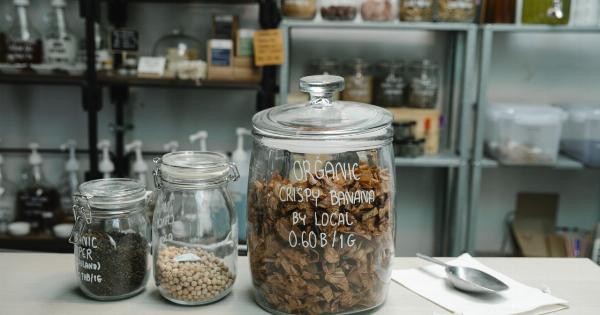Respiratory infections can be quite common, especially during the cold and flu seasons. These infections can range from mild to severe, causing symptoms like coughing, sneezing, sore throat, and difficulty in breathing.
Having a strong immune system plays a crucial role in preventing and fighting off these infections. One effective way to enhance your immune system is by improving your metabolism. In this article, we will explore ten natural metabolism boosters that can help reduce your chances of respiratory infections.
1. Green Tea
Green tea is a popular beverage known for its numerous health benefits. It contains compounds called catechins that have powerful antioxidative and anti-inflammatory properties, which can boost your metabolism and enhance your immune system.
Catechins help in reducing the risk of respiratory infections by fighting off harmful bacteria and viruses. Additionally, green tea is a great source of hydration, keeping your respiratory system moist and making it more resistant to infections.
2. Spicy Foods
If you enjoy adding a little kick to your meals, you’ll be happy to know that spicy foods can also increase your metabolism.
Spices like chili peppers, cayenne pepper, and turmeric contain a compound called capsaicin, which raises your body temperature and increases metabolism. This boost in metabolism helps improve blood circulation and enhances the functioning of your immune system, making it more efficient at fighting off infections.
3. Ginger
Ginger has been used for centuries as a natural remedy for various illnesses. It possesses powerful anti-inflammatory and antioxidant properties, which can help strengthen your immune system and reduce the risk of respiratory infections.
Gingerol, the active compound in ginger, has been found to improve lung function and clear airway passages, making it easier for you to breathe. Incorporating ginger into your diet or enjoying a cup of ginger tea can be a great way to boost your metabolism and respiratory health.
4. Probiotics
Probiotics are beneficial bacteria that promote a healthy gut microbiome. They can improve digestion and nutrient absorption, which in turn supports a strong immune system. A healthy gut is essential for overall health, including respiratory health.
Probiotics help reduce inflammation in the body and increase the production of antibodies, reducing the risk of respiratory infections. Yogurt, kefir, sauerkraut, and kimchi are some excellent food sources of probiotics.
5. Citrus Fruits
Citrus fruits like oranges, lemons, and grapefruits are rich in vitamin C, which is known for its immune-boosting properties. Vitamin C helps stimulate the production of white blood cells, which play a vital role in fighting off infections.
Additionally, citrus fruits contain antioxidant compounds that help reduce inflammation in the respiratory tract and improve lung function. Including these fruits in your diet can improve your metabolism and reduce the risk of respiratory infections.
6. Omega-3 Fatty Acids
Omega-3 fatty acids found in fatty fish like salmon, sardines, and mackerel have numerous health benefits, including boosting metabolism and improving immune function.
Omega-3 fatty acids reduce inflammation in the body, which can help prevent respiratory infections. They also enhance the activity of white blood cells, making them more effective in fighting off infections.
Including omega-3-rich foods in your diet or taking supplements can strengthen your immune system and decrease the chances of respiratory infections.
7. Exercise Regularly
Regular physical activity not only helps maintain a healthy weight and improves cardiovascular health but also boosts your metabolism.
Engaging in aerobic exercises like jogging, cycling, or swimming can increase your metabolic rate and strengthen your immune system. Exercise helps flush bacteria out of the lungs and airways, reducing the risk of respiratory infections. Aim for at least 30 minutes of moderate-intensity exercise most days of the week to reap the benefits.
8. Turmeric
Turmeric is a yellow spice commonly used in Indian cuisine. Curcumin, the active compound in turmeric, is known for its powerful anti-inflammatory and antioxidant properties.
It can help reduce inflammation in the respiratory system and strengthen the immune response. Adding turmeric to your meals or consuming turmeric supplements can improve your metabolism and decrease the chances of respiratory infections.
9. Sleep Well
Adequate sleep is crucial for maintaining a healthy immune system. Lack of sleep can weaken your immune system and make you more susceptible to respiratory infections.
Research has shown that people who get less than seven hours of sleep are more likely to catch a cold or flu. Aim for 7-8 hours of good quality sleep each night to help your body recover and strengthen your immune system. Establishing a consistent sleep routine and creating a conducive sleep environment can significantly improve your sleep quality.
10. Drink Plenty of Water
Proper hydration is essential for maintaining a strong immune system. Drinking enough water helps flush out toxins from your body and keeps your respiratory system moist, reducing the risk of respiratory infections.
Staying hydrated also improves blood circulation, which is vital for a healthy metabolism. Make sure to drink at least 8-10 glasses of water per day, and more if you engage in strenuous physical activities or live in a hot climate.
Conclusion
Boosting your metabolism is an effective way to strengthen your immune system and reduce the chances of respiratory infections.
Incorporating these natural metabolism boosters into your daily routine can provide you with numerous health benefits, including improved respiratory health. From sipping green tea and enjoying spicy foods to incorporating ginger and probiotics into your diet, these simple lifestyle changes can make a significant difference in reducing your vulnerability to respiratory infections.
Remember to also prioritize regular exercise, adequate sleep, and hydration for overall well-being and a robust immune system.





























